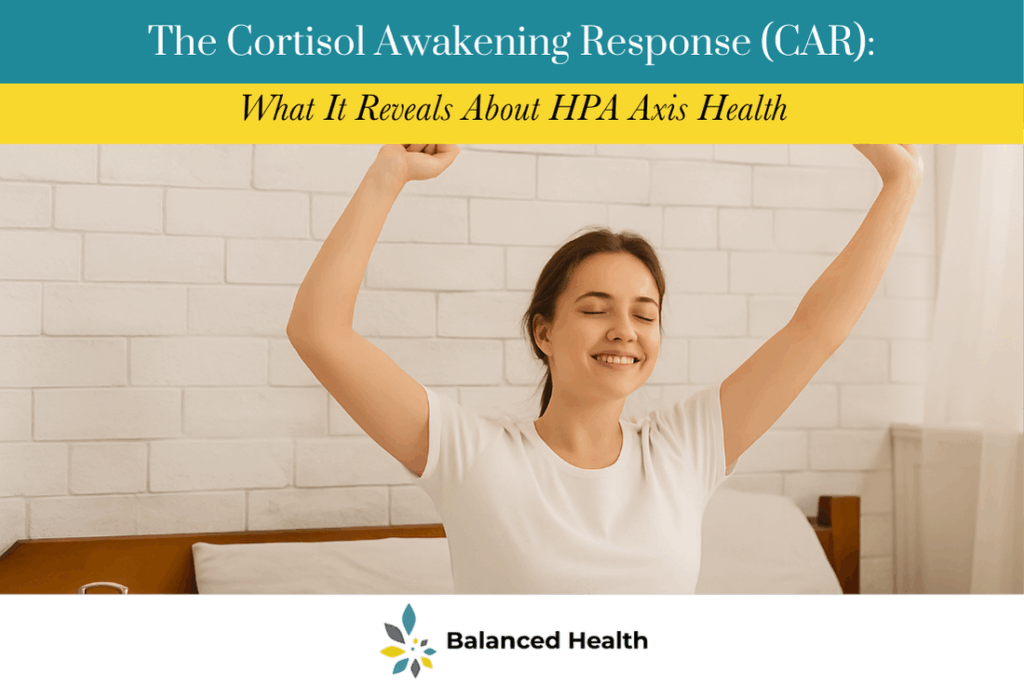
Understanding the Cortisol Awakening Response (CAR)
If you’ve ever woken up feeling groggy, unmotivated, or overwhelmed—even after a full night’s sleep—you may be experiencing dysregulation in your Cortisol Awakening Response (CAR). The CAR is a vital marker of your Hypothalamic-Pituitary-Adrenal (HPA) axis function, and it holds deep insights into your stress physiology, resilience, and overall endocrine balance.
At Balanced Health, we use advanced testing and interpretation to evaluate the CAR as part of a broader strategy for optimizing hormonal and adrenal function. Let’s explore what the CAR is, why it matters, and how it can guide personalized care for fatigue, burnout, anxiety, and immune dysfunction.
🔬 What is the Cortisol Awakening Response (CAR)?
The Cortisol Awakening Response refers to the natural rise in cortisol levels that occurs within the first 30–45 minutes after waking. It is not the same as your total daily cortisol production—rather, it’s a dynamic response driven by your brain’s anticipation of the day ahead.
- Normal CAR: A healthy individual shows a 50–75% increase in cortisol within 30 minutes of waking.
- Blunted CAR: May indicate burnout, depression, PTSD, or chronic stress adaptation.
- Exaggerated CAR: May be associated with high anticipatory anxiety, overtraining, or early-stage stress overload.
🧠 The CAR and HPA Axis Health
The HPA axis is your body’s central stress response system. The CAR provides a snapshot of how this system is functioning—especially how well your brain and adrenal glands are communicating.
Why CAR Testing Is Valuable:
- Offers a real-time look at HPA axis reactivity and resilience
- Detects early signs of stress dysregulation before full adrenal fatigue sets in
- Provides insight into mental health, immune function, and inflammation
- Helps personalize interventions like adaptogens, lifestyle changes, or hormone support
🧪 How Do We Test the CAR at Balanced Health?
We use salivary hormone testing collected at home upon waking, with samples typically taken at:
- Immediately upon waking
- 30 minutes post-waking
- 60 minutes post-waking
- Noon, afternoon, and evening (for full diurnal cortisol curve)
These data points allow us to interpret both your CAR pattern and daily cortisol rhythm, giving us a nuanced understanding of your stress biology.
🌿 How Do We Support a Healthy CAR?
Your treatment plan at Balanced Health is fully individualized. Based on your test results and symptoms, we may recommend:
- Targeted adaptogenic herbs (e.g., Rhodiola, Ashwagandha, Eleuthero)
- Chrononutrition (timing meals to support cortisol rhythms)
- Light therapy or morning sun exposure
- Blood sugar stabilization
- Mind-body strategies (e.g., breathwork, HRV training, gentle morning movement)
- Neuroendocrine and nutritional support to recalibrate the HPA axis
🧠 Q&A: The Cortisol Awakening Response (CAR)
Q: How is the CAR different from general cortisol testing?
A: Most standard cortisol tests look at levels throughout the day or only at one time point. CAR testing focuses on the critical transition upon waking—this makes it a more sensitive marker of early HPA dysfunction.
Q: What symptoms might indicate an abnormal CAR?
A:
- Fatigue upon waking despite enough sleep
- Difficulty getting out of bed
- Morning anxiety or “wired but tired” feelings
- Poor focus and low morning motivation
- Mid-morning energy crashes
Q: Can a disrupted CAR affect my immune system?
A: Yes. Cortisol regulates inflammation and immunity. A blunted or exaggerated CAR can reflect or contribute to immune dysregulation, making you more prone to infections or chronic inflammatory states.
Q: Who should consider CAR testing?
A:
- Individuals with chronic fatigue, burnout, or adrenal dysfunction
- Patients with anxiety, depression, or PTSD
- High performers under prolonged stress
- Athletes recovering from overtraining
- Individuals with autoimmune or inflammatory disorders
Q: Can lifestyle alone reset the CAR?
A: While some people may see improvements with stress reduction, nutrition, and sleep hygiene, others may require targeted supplementation and clinical guidance—especially if the disruption has been long-standing or tied to trauma.
Q: How long does it take to restore a healthy CAR?
A: Depending on severity, improvements can be seen in as little as 4–8 weeks with consistent care. Full HPA recalibration may take 3–6 months or more in complex cases.
📞 Ready to Understand Your Hormonal Blueprint?
If you suspect your stress response system isn’t functioning at its best, we’re here to help. At Balanced Health, we specialize in advanced hormone testing, root-cause analysis, and personalized protocols to restore balance and resilience.
Contact Us Today:
📍 Balanced Health
1819 Union St
San Francisco, CA 94123
📞 (415) 915-5454
🌐 balancedhealthsf.com
Let’s decode what your cortisol is telling you—because “normal labs” don’t always mean optimal health.
 Balanced Health
Balanced Health